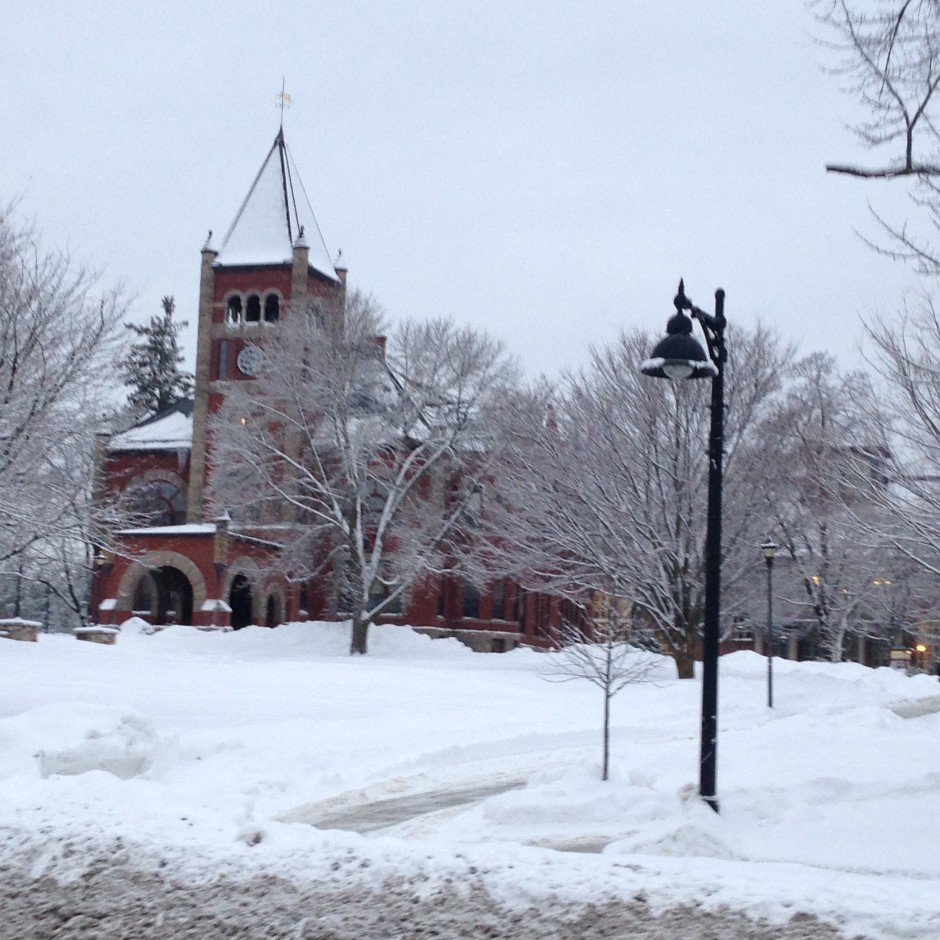Last week I sent off 13 revised poems to Charles Simic, my workshop leader for the semester that has just ended, and that finished off my first year on the Creative Writing MFA at UNH. It has been quite a semester: there was snow, snow, and then more snow (hence the picture); cancellations and catch-ups; cut-ups and found poems, stream-of-consciousness and weird appearances of the alphabet as a poetic constraint; and, at last, sun, flowers, and warmth.
I said in my last post that the Fall semester was mainly about settling in: getting used to being a student and to living in America. By contrast, this second semester was mainly about getting unsettled. I went into it feeling reasonably confident about my poetry, having written fluently in my first semester and had a number of poems well-received by teachers and peers. But it wasn’t long before I started to feel like everything I thought I knew was wrong!
As I said, I worked with Charlie Simic in workshop. In my first feedback, he said something along the lines of, “It’s a good poem but it should be half the length. Leave more out.” That poem was 25 lines of C K Williams-esque length (i.e. longer than the page is wide). OK, I thought, I’ll leave more out. My next poem was in 24 very short lines, mostly about 4 or 5 words. To this poem, Charlie said, “Maybe the first three lines you could keep.”
Meantime, in my other poetry course and in conferences, David Rivard was giving me the most intensive poetry training ever. He went over my drafts with a microscope, picking up on language that was “anecdotal” (telling narrative without being interesting as language), that needed more “pressure”, especially in the adjectives, or was trying to work by rhetoric alone rather than through image and information. He also threw at me suggestions for mixing registers, types of language, and scales of perception, and for making sentences “respond to each other.” Mostly I left his office reeling. In classes he showed me how to read familiar and unfamiliar poets, from Dickinson to Fanny Howe to Apollinaire, with an intensity of technical insight that was new to me.
Between them, I felt was being caught in a pair of pincers, and wriggling! I’m kind of familiar with this, because I’ve inflicted it myself on poor undergraduate students, but it wasn’t so easy to go through as the recipient. I felt unable to use my own voice for a while, and experimented with making poems out of found texts – mainly overheard talk. That was fun and allowed me to apply the advice without taking it personally.
My parents came over from Britain for spring break. It was lovely to see them, to show them where we live now, and for them to spend time with the grandchildren. It made me pretty homesick when they left, but also released me to start using my own words and voice again. In Rivard’s class we read the New York School, whom I have loved for some time, so that helped too – a kind of homecoming. I kept experimenting, especially with prose poems (which are new for me), and felt that my writing was getting weirder and weirder as I got more tired out – which is when the alphabet started making unexpected appearances as a structural constraint, in one forward and one reverse Abecedarian.
When we had the end-of-semester party, I talked with some other folks about how I felt I’d been taken apart this semester and didn’t know how to put myself back together. They felt the same way. But then I did a reading for UNH’s Graduate Research Conference, and as I looked for material, I realised how much sharper my poems are from this semester. I seem to have absorbed more than I thought I had, and most of my poems from the fall seem bloated and wordy now. When I went through my poems to send to Charlie, I was happy with what I felt I’d learned.
So now it’s summer! I have various things planned, including a workshop at the Sarah Orne Jewett House in South Berwick, and a summer writing camp for kids. I’ll write more about both of those soon.

